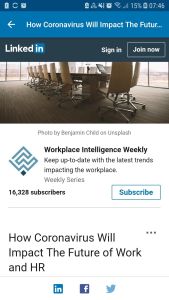Join getAbstract to access the summary!

Join getAbstract to access the summary!
Dan Schawbel
How Coronavirus Will Impact the Future of Work and HR
LinkedIn, 2020
What's inside?
Human resource teams need to step up to help companies survive and recover from the COVID-19 outbreak.
Recommendation
If you’re an HR professional, the COVID-19 crisis may be pushing you to the front lines. HR needs to switch into high gear in many companies as they lay off teams in droves, make remote work mandatory and adapt to new government regulations. But HR teams also have a chance to guide companies responsibly in the aftermath of the virus. Best-selling author Dan Schawbel walks you through new industry trends.
Take-Aways
- The HR field needs to adapt rapidly to changes induced by the coronavirus.
- Virtual job interviews and online learning will continue to grow in popularity.
- Employee compensation will buckle under a suffering economy and widespread quarantines.
- The pandemic is putting remote work policies and mental health benefits in the spotlight.
- HR needs to be swift in implementing emerging government policies.
- Robots in the workplace will become more prominent, requiring teams who know how to leverage chatbots, virtual reality and other tools.
Summary
The HR field needs to adapt rapidly to changes induced by the coronavirus.
HR professionals are vulnerable to losing their jobs during the COVID-19 pandemic. As experts in recruiting, implementing government policies and dealing with other workforce issues, they are also in a unique position to stabilize tumultuous businesses. HR teams can help businesses react and bounce back from the crisis.
“HR leaders that will maintain their value are those that can develop and initiate disaster recovery, remote work and mental health programs, control costs, focus on talent management and crisis communications, all while staying inside legal parameters and being an asset to their CEOs.”
US government experts warn that the country’s unemployment rate could climb to 20%, marking a recession. About 25 million people are at risk of losing their jobs around the world. Companies never fully recovered from the 2008 recession and will continue to take a long time hiring new employees, sometimes mandating hiring freezes to save money. After the pandemic, pay raises will likely be scarce, the pressure for employees to produce will intensify and widespread worker burnout will persist.
Virtual job interviews and online learning will continue to grow in popularity.
Out of fear that job candidates may carry the virus, technology and recruiting businesses in particular are shifting from meeting applicants in person to connecting remotely. Video interviews via Zoom or Webex are cheaper, faster and farther-reaching, so this trend will persist after the coronavirus gets contained. The UK accounting company Ernst & Young was one of the first to adapt to the pandemic by moving all of its student recruiting events into a virtual space.
Cancellations of conferences and events have promoted the rise of webinars and online training courses. Even before the pandemic, experts projected online learning profits to skyrocket from $107 billion to $325 billion over a decade.
“Learning should be a daily ritual and if companies aren’t providing access to it, individuals should feel empowered to invest in their own education.”
HR leaders should provide new e-learning initiatives, invite virtual speakers and offer online resources.
Employee compensation will buckle under a suffering economy and widespread quarantines.
At every hierarchical level, people will face job losses, pay cuts and fewer bonuses. According to the International Labor Organization, the pandemic could decrease worker salaries by $860 billion to $3.4 trillion. To save their jobs, even the highest paid executives – among them the CEOs of Marriott, Lyft and multiple major airlines – receive lower salaries.
The pandemic is putting remote work and mental health benefits in the spotlight.
HR professionals need to develop savvy policies to allow employees to work virtually, even after the outbreak ends. A Gartner survey found that three out of 10 workers will keep working remotely after the pandemic ends.
As employees navigate social distancing, self-isolation, possible job loss and working fewer hours, HR needs to set up benefits to help improve their mental health. In a Chinese study, 43% of people indicated that they suffered from pandemic-related anxieties. Starbucks tries to alleviate distress by providing workers with as many as 20 free therapy sessions and unlimited access to apps devoted to self-care.
Your company’s policy regarding performance reviews can show your employees you care. Acknowledge the unusual circumstances and be generous during assessments, especially the ones that are linked to bonuses.
HR needs to be swift in implementing emerging government policies.
More than half of HR professionals estimate that accommodating new regulations costs as much as $100,000. In response to the pandemic, HR teams of small and mid-sized US companies must prepare policies that comply with the Families First Coronavirus Response Act, for instance, a paid sick leave policy for COVID-19 patients. Even at larger companies, HR must work out new guidelines for sick leave for the current situation and beyond.
Robots in the workplace will become more prominent, requiring teams who know how to leverage chatbots, virtual reality and other tools.
Automation saves money and increases efficiency but also depletes jobs. As the virus spreads, robots perform many tasks, including manufacturing goods, disinfecting hospitals and helping sick patients speak with their doctors. As people get more comfortable working alongside robots, HR staffers should familiarize themselves with virtual reality and chatbots and make use of such technology to engage remote workers.
COVID-19 presents a threat to the human resources field, but also allows you and your team to prove your value within the company and to the CEO.
About the Author
Dan Schawbel is a best-selling author of three books, including Back to Human. He’s a managing partner of Workplace Intelligence.
This document is restricted to personal use only.






















Comment on this summary